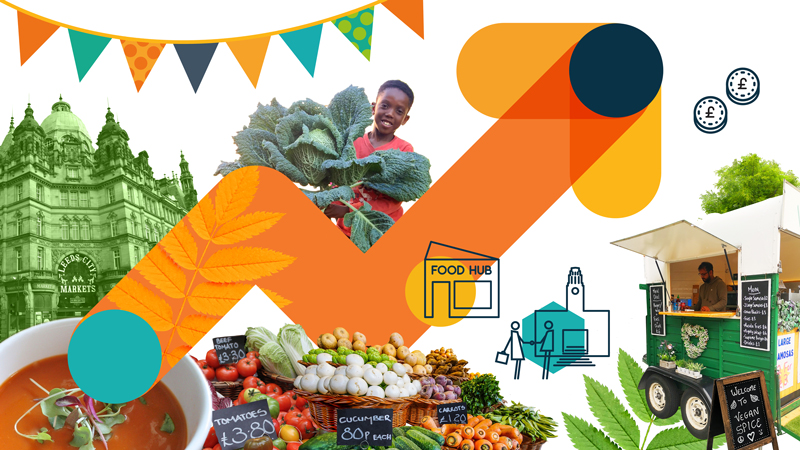
Why it is important
Food security is our ability to access food, pay for it, and prepare nutritious meals.
Having food security allows us to contribute economically, environmentally, socially, and culturally to society. It is essential to the foundations of a healthy, inclusive, and sustainable economy. Tackling poverty, inequality and improving the quality of life for all of us is at the heart of the Leeds Food Strategy.
Increasing numbers of us are experiencing poverty, and Leeds is no different, too many of us struggle to put food on the table. Local charities, community groups together with the council are already making a real difference every day to help those most in need.
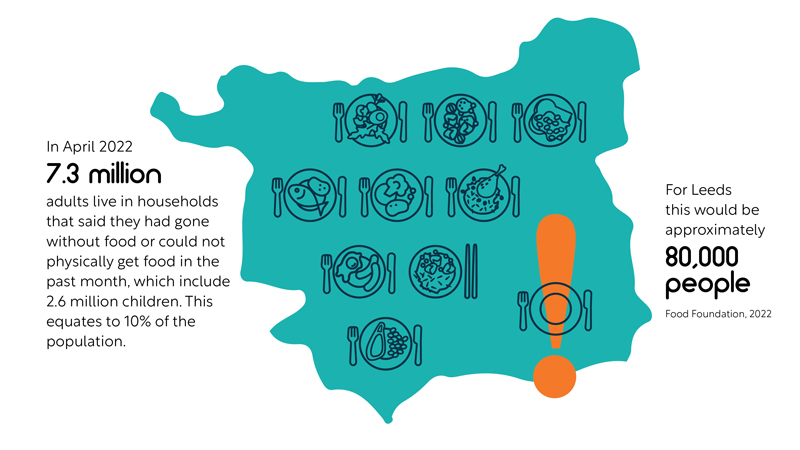
Despite this, the utilisation of food banks has reached unprecedented levels after a year-on-year rise that is both unacceptable and unsustainable. Furthermore, there has been a recent emergence of Food Pantries, which aspire to offer a more sustainable form of support, resulting in growing reliance on these services. While all such models and programmes distributing food aid and emergency food parcels have a place in terms of crisis and essential support, we shouldn't have to depend on these services to get by. Ultimately, we need to tackle the causes of food insecurity and not just its impacts. This means helping to ensure that more of us can and know how to physically access, afford, and prepare healthy nutritious food—without compromising our ability to meet other basic needs.
As part of this mission, we also need to do everything we can to help more of us become financially secure and independent. We can support our vibrant food sector (every business and organisation involved in the growing, production, cooking, serving, or selling of food in Leeds) to grow and help them to embrace new and better ways of producing, selling, and serving food. A successful, innovative, and diverse economy is one that it is fair, pays well, and works for all of us. By choosing local and regional food producers more often for what we eat we help local businesses to create more jobs and keep more money locally.
Leeds prides itself on its well-established partnership approach to tackling food insecurity. Currently this includes Leeds Food Aid Network which brings together a wide range of food aid organisations—including FareShare Yorkshire, Rethink Food and FoodWise Leeds—all working in collaboration with the council, universities, businesses and the third sector. Additionally, to create a vibrant food economy we rely on our partners including local food and drink businesses as well as public sector partners and anchor organisations who set out to achieve the same goals as us.
By working together with partners across the city to reduce food insecurity and grow an inclusive food economy, the Leeds Food Strategy aims to improve the quality of life and financial resilience of Leeds households. We’re proud that Leeds has some of the best food in the country and with our plans, many more of us will be able to enjoy more of it. It is essential to continue developing and reinforcing this collective approach in every sector, and with the citizens of Leeds, to align actions with the objectives of the Leeds Food Strategy.
Our plan

Objective 1 - Tackle factors limiting people’s ability to afford the food they need
Even before the COVID-19 pandemic, pay hadn’t been keeping up with the rising cost of living and many people had little job security. Currently around 14.3% of Leeds employees earn below the real living wage.
On top of that, public sector funding cuts and welfare reform has reduced much of the support available to people in poverty. Barriers including a lack of awareness or difficulties accessing financial support prevent some residents from receiving what they qualify for.
All of these factors combine to mean that fewer people can afford good food, which is the biggest expenditure for households after housing, fuel, and energy. Official statistics show that low-income households spent much more of their earnings (14%) on food than the average household (11%) in 2022, and this trend is expected to have worsened since.
To tackle the root causes of food insecurity, we need to reduce poverty and economic inequalities. We need to encourage more organisations to pay the real living wage and help businesses (including in our food sector) to create good new jobs that mean more people can live happier and healthier lives.
Actions to support this objective
- Champion actions and initiatives that help address poverty and food insecurity, including fair wages and financial support.
- Raise awareness of how residents can increase their incomes, including helping them to access any financial support they may qualify for.
- Develop and sustain programmes that improve access to healthy food for people on low incomes.
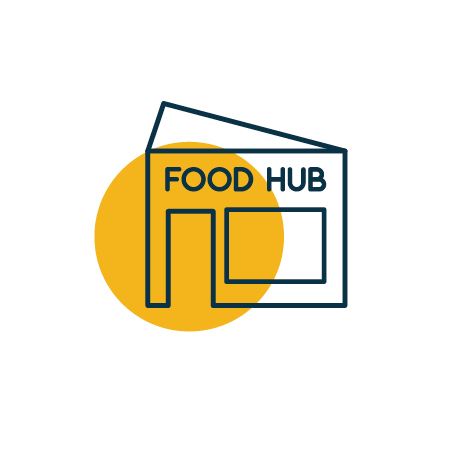
Objective 2 - Help those in need of support to access affordable and inclusive food initiatives
With more people experiencing food insecurity and sometimes having to choose between heating and eating, rising numbers of people are turning to food aid services.
Local organisations are making a real difference to help those most in need, often working in partnership with the council. Leeds has a wide range of food aid provision available including emergency support via food banks, the Local Welfare Support Scheme, food pantries, and community cafes. In 2023, it is estimated that more than 81,959 food parcels were distributed via food aid providers.
We believe that food aid provision could be even more helpful if providers in Leeds were better connected with each other and with financial advice or support services. We could also improve these services if they were made more inclusive of cultural and dietary requirements.
Actions to support this objective
- Work together with partners to improve, and make more inclusive, affordable food initiatives so that everyone can access the help they need.
- Connect food aid providers with other free, impartial, and confidential support services to help residents access information and support to prepare and afford healthy meals.
- Develop and promote a new Leeds Food Aid Charter setting out consistent key principles and best practice for local food aid providers to follow.
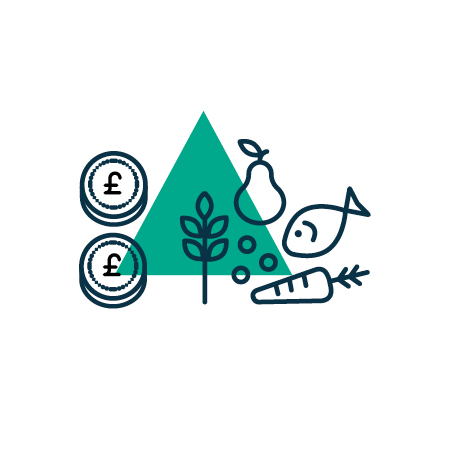
Objective 4 - Support and unlock opportunities for local food businesses and workers
By supporting retail, food and drink, and social entrepreneurs to start-up and grow successful businesses we can facilitate inclusive growth within our local economy. This means creating new and better jobs, contributing towards reduced poverty and inequality in the city, and nurturing the food culture we want.
We can support businesses by connecting them to relevant advice and help entrepreneurs to start up, grow, and develop innovative businesses. We can also explore and support new opportunities for innovative and sustainable food production.
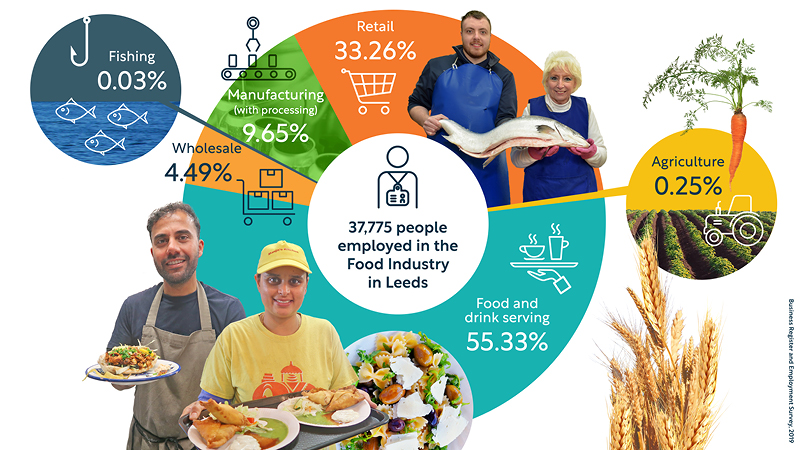
Actions to support this objective
- Help food businesses grow and support jobs by connecting them to relevant support and advice.
- Create and expand pathways to market for locally produced food.
- Promote opportunities for recruitment, workforce development, and apprenticeships in the local food sector.
- Support innovation and research that promotes the viability of local food enterprises.

Objective 5 - Promote Leeds as a vibrant food city—celebrating our independent food, drink, events, and culture
Leeds offers one of the best independent restaurant, cafe and bar scenes in the country.
We enjoy a diverse and innovative food hospitality sector featuring everything from world-class fine dining to mouth-watering street food. You can enjoy familiar cuisines from all over the world or sample something new here in Leeds. We’re proud of our impressive food heritage too.
This varied food offer supports Leeds’ thriving visitor economy by helping to draw people and investment into the city and supporting inclusive economic growth. In turn, this generates opportunities for creative, enthusiastic food and drink entrepreneurs to launch and grow their businesses in the city. The many independent food businesses in Leeds help keep money circulating within our local economy.
Food is widely celebrated in Leeds through a variety of festivals and community led events. All across the city, food pop-ups, farmers markets, cookery classes can be enjoyed throughout the year. We will continue to build on what Leeds already does well to support the city’s local food economy. We will proudly celebrate our food culture, heritage, and diversity, and work to raise the city’s profile as a vibrant food city.
Actions to support this objective
- Work with the food sector to increase visitor demand for local food and drink across the city.
- Celebrate the culture and diversity of Leeds by promoting the local food offer available in different parts of the city.